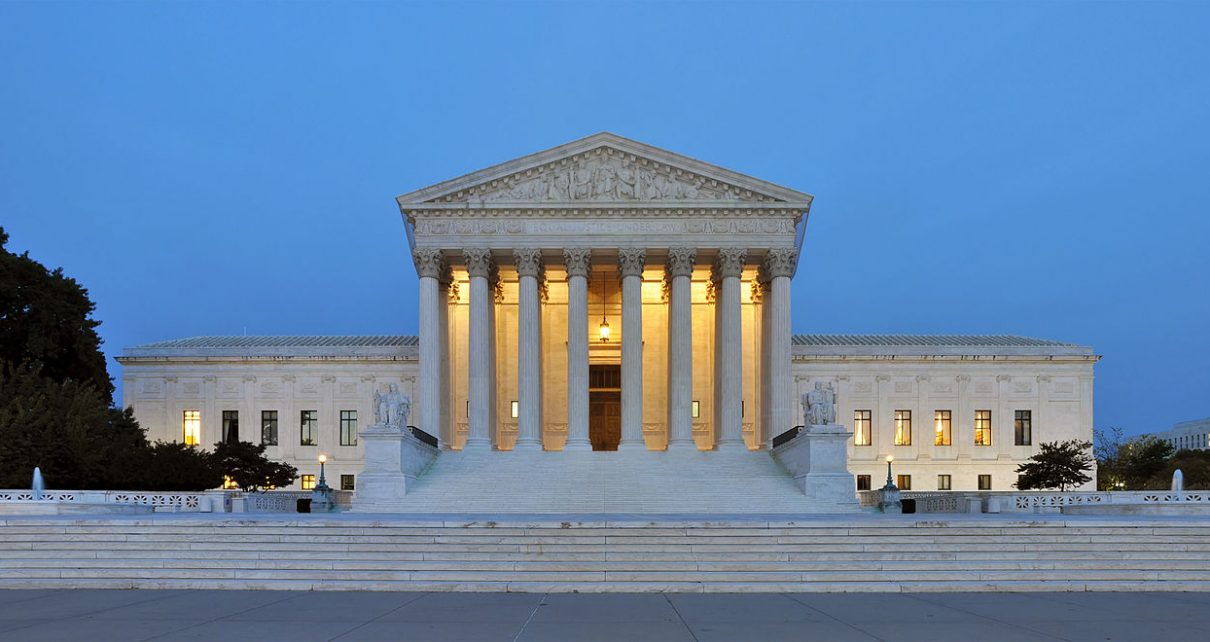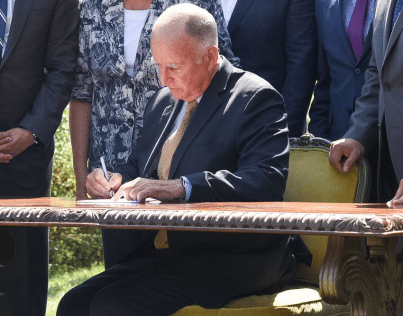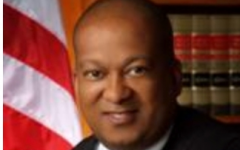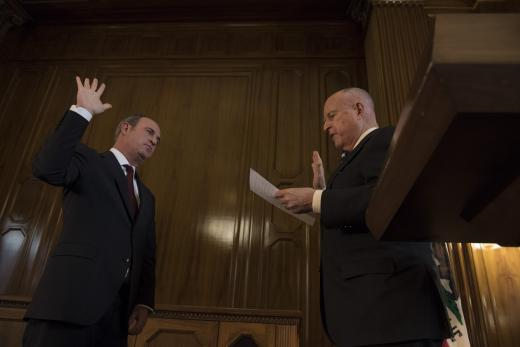
Supreme Court of the United States. (Photo: U.S. Supreme Court)
California Electoral Vote Process Case Turned Down By U.S. Supreme Court
Rodriguez v. Newsom would have challenged the winner-take-all approach in choosing presidential electors
By Evan Symon, June 15, 2021 4:01 pm
The United States Supreme Court declined to hear Rodriguez v. Newsom on Monday, keeping intact California’s winner-take-all approach to selecting presidential electors.
According to the case petition, comedian Paul Rodriguez, Rocky Chavez, the League of United Latin American Citizens, and the California League of United Latin American Citizens claimed that current winner-take-all process is unconstitutional. They argued that the current system of voting for president in California isn’t a vote for president, but rather a vote for electoral college electors. As California has voted Democratic for all presidential elections since 1992, it meant that all Republican and other party votes were ignored, diluting and discarding their votes and violating their rights in casting an effective vote.
“This cancellation of the votes of the minority party is unconstitutional for two reasons,” noted the petition. “First, as [a previous court ruling] makes clear, the government may not discard millions of votes at an intermediate step of a multi-stage election, like that for President.
“Second, as this Court made clear in White v. Register, on which the court below erroneously relied—states may not use at-large, slate elections for multi-member bodies to disregard the preferences of a minority of voters.
“Winner-take-all is not within the Constitution. It is instead a partisan invention by the states that has become the default for the nation.”
A winner-take-all approach in choosing presidential electors
However, the arguments were quickly denounced in a reply brief to Rodriguez v. Newsom by attorneys for Governor Gavin Newsom, then-acting California Secretary of State James Schwab, and other respondents in the original petition.
Specifically, they argued that the current system “does not treat any voter or group of voters differently from any other or prevent anyone from casting a vote.”
While the Supreme Court turned down hearing the case without comment, legal experts noted that this will not be the last time that California or another state will bring this issue up.
“There’s a lot of questions here,” noted John Loughton, a lawyer who has been involved in election cases before, to the Globe on Monday. “But right now Republicans are looking to shake up the electoral system, much like Democrats have been since Bush v. Gore. Many want more of a result based on national popular vote rather than through states. Others want states to vote proportionately and have electors be chosen from the candidate percentage in each state. Under this system, Ross Perot would have grabbed a few electoral votes in California in 1992, with Libertarian Gary Johnson also likely snagging one in 2016.”
“But there are also questions on where the vote for electors should stop. If electors are proportional, will they need to be duty bound to vote for the state winner? Will they be a faithless elector? Will it be more split like Nebraska or Maine currently can do in a presidential election? And what about those votes in the minority? Are they not counted at all in a win? A case like this can really open Pandora’s Box for future cases, and the Supreme Court has really steered away from the electoral college in recent years. Last year they ruled that states can restrict faithless electors, and that was a huge deal.”
“They are very choosy on big issues like this. So it’s like them choosing a gun rights case or an affirmative action case or an abortion case. It doesn’t happen often, but when they do, it can send shockwaves. And they obviously don’t want to rock this boat just yet.”
It is unknown if similar cases in lower courts will be heard later this year.
- Congressman Adam Schiff Robbed of his Luggage in San Francisco Car Break In - April 26, 2024
- U.S. Senate Candidate Steve Garvey Denounces Protestors On Campuses Across California, Nation - April 25, 2024
- Bill Requiring Age Verification for Online Pornography Gains Traction In Assembly - April 25, 2024





Who was the author of the bill that took away us Voters. A Judge makes our decision now or who as that power. To determine what I want not what they want.
Also Dr. Francis Boyle the Author of the Biological Warfare Act 1989. I suggest you read his Bio. International law also Ex- Head of Pfizer. The Vaccine is a Biological Weapon it’s 5 in 1 . It kills you later so it doesn’t look like ” THEY DID IT “. If You Could Help me with this. I need some guidance thank you.
@Adan, the California State Legislature decides. Not a judge. If you want to change, how to make your voting choices better, vote for different people to go into the California Assembly and Senate. Vote for Republicans. I think that Paul and Rocky did a good try, but the State decides how we vote; not the Federal government or United States Supreme Court. About the biological weapon virus from China, yes, we know about this. Thank you for asking.
The trouble with voting for Republicans is that they sell themselves like common street walkers to the lowest bidder. Time and again the Democrats have enticed a few Republicans to turn their backs on their constituents. In California, the Republicans are nothing but the junior branch of the Democrats. Look at the highest Republican from California McCarthy. Where is his outrage over the US holding the political prisoners like those arrested for peacefully participating on Jan 6? Why is Vladimir Putin more outspoken about our political prisoners than the GOP?
And why is the biggest message out of the feckless CAGOP a constant barrage of pleas for contributions, not challenging rampant vote fraud as perpetrated by the Democrat party for years, if not decades???
Maybe if Ms. Patterson et al actually DID SOMETHING OF RELEVANCE, people would be more likely to contribute to them???
California is such a political flustercluck…
I agree, CriticalDfence9. My contributions go ONLY to my local GOP group and individual candidates. Nothing to either the CAGOP or RNC. That is, UNTIL they clean up their acts and get their rear ends MOVING.
Proportional awarding of electors would not be a fair “compromise” or solution.
There are good reasons why no state even proposes, much less chooses, to award their electors proportionally.
In 4 of the 8 elections between 1992 and 2020, the choice of President would have been thrown into the U.S. House (where each state has one vote in electing the President).
Based on the composition of the House at the time, the national popular vote winner would not have been chosen in 3 of those 4 cases, regardless of the popular vote anywhere.
Electors are people. They each have one vote. The result would be a very inexact whole number proportional system.
Every voter in every state would not be politically relevant or equal in presidential elections.
It would not accurately reflect the nationwide popular vote;
It would reduce the influence of any state, if not all states adopted.
It would not improve upon the current situation in which four out of five states and four out of five voters in the United States are ignored by presidential campaigns, but instead, would create a very small set of states in which only one electoral vote is in play (while making most states politically irrelevant),
It would not make every vote equal.
It would not guarantee the Presidency to the candidate with the most popular votes in the country.
The National Popular Vote bill is the way to make every person’s vote equal and matter to their candidate because it guarantees the majority of Electoral College votes to the candidate who gets the most votes among all 50 states and DC.
“There are good reasons why no state even proposes, much less chooses, to award their electors proportionally.”
@Susan Anthony, you have obviously NOT read the article carefully. Your statement is wrong. Maine and Nebraska use proportional awarding of electoral votes.
Maine and Nebraska do not apportion their electoral votes to reflect the breakdown of each state’s popular vote.
Maine (since enacting a state law in 1969) and Nebraska (since enacting a state law in 1992) have awarded one electoral vote to the winner of each congressional district, and two electoral votes statewide.
When Nebraska in 2008 gave one electoral vote to the candidate who did not win the state, it was the first split electoral vote of any state in the past century.
2016 was the first time one electoral vote in Maine was given to the candidate who did not win the state.
The time has come for people in California to stop constantly playing DEFENSE against big government intrusion. In fact, as Bill Walsh (49ers) taught us – The BEST defense, is a GREAT offense. In addition to VOTING REFORM, we must ATTACK the ideas of Chinese Communist MAOISM that have infiltrated our educational and political systems through the proponents of American Marxism. California should DIVEST CalPERS and CalSTRS from Chinese companies associated with the Peoples Liberation Army (PLA) in line with the Federal legislation introduced by Senator Rubio (https://www.myfederalretirement.com/s-1993/).
Kamala Harris is V.P. of the U.S. but she couldn’t win California in the Primaries thus in fact and essence nullifying the majority of voters in California
The 2020 Supreme Court reaffirmed the power of states over their electoral votes.
The ruling says electors must abide by state laws and that such laws are constitutional.
The decision held that the power of the legislature under Article II, Section 1 of the Constitution is “far reaching” and it conveys the “the broadest power of determination over who becomes an elector.” This is consistent with 130 years of Supreme Court jurisprudence.
No method is mentioned in the U.S. Constitution.
Article II, Section 1
“Each State shall appoint, in such Manner as the Legislature thereof may direct, a Number of Electors….”
The U.S. Supreme Court has repeatedly characterized the authority of the state legislatures over the manner of awarding their electoral votes as “plenary” and “exclusive.”
The National Popular Vote bill is 72% of the way to guaranteeing the majority of Electoral College votes and the presidency to the candidate who wins the most popular votes in the country. The bill changes state winner-take-all laws (not mentioned in the U.S. Constitution, but later enacted by 48 states), without changing anything in the Constitution, using the built-in method that the Constitution provides for states to make changes.
It requires enacting states with 270 electoral votes to award their electoral votes to the winner of the most national popular votes. All of the electors from the enacting states would be required to vote for the winner of the most national popular votes.
All voters would be valued equally in presidential elections, no matter where they live.
“It requires enacting states with 270 electoral votes to award their electoral votes to the winner of the most national popular votes. All of the electors from the enacting states would be required to vote for the winner of the most national popular votes.”
@Susan Anthony. So, if this is such a good idea why is it that ONLY the states with Democrat-controlled legislatures have signed on to it? (https://ballotpedia.org/National_Popular_Vote_Interstate_Compact)
Newt Gingrich summarized his support for the National Popular Vote bill by saying:
“No one should become president of the United States without speaking to the needs and hopes of Americans in all 50 states. … America would be better served with a presidential election process that treated citizens across the country equally. The National Popular Vote bill accomplishes this in a manner consistent with the Constitution and with our fundamental democratic principles.”
Support for a national popular vote for President has been strong among Republicans, Democrats, and Independent voters, as well as every demographic group in every state surveyed. In the 41 red, blue, and purple states surveyed, overall support has been in the 67-81% range – in rural states, in small states, in Southern and border states, in big states, and in other states polled.
Most Americans don’t ultimately care whether their presidential candidate wins or loses in their state or district. Voters want to know, that no matter where they live, even if they were on the losing side, their vote actually was equally counted and mattered to their candidate. Most Americans think it is wrong that the candidate with the most popular votes can lose. It undermines the legitimacy of the electoral system. We don’t allow this in any other election in our representative republic.
In 2018, the National Popular Vote bill in the Michigan Senate was sponsored by a bipartisan group of 25 of the 38 Michigan senators, including 15 Republicans and 10 Democrats.
The bill was approved in 2016 by a unanimous bipartisan House committee vote in both Georgia (16 electoral votes) and Missouri (10).
In 2016 the Arizona House of Representatives passed the bill 40-16-4.
Two-thirds of the Republicans and two-thirds of the Democrats in the Arizona House of Representatives sponsored the bill.
In January 2016, two-thirds of the Arizona Senate sponsored the bill.
In 2014, the Oklahoma Senate passed the bill by a 28–18 margin.
In 2009, the Arkansas House of Representatives passed the bill
On March 25, 2014 in the New York Senate, Republicans supported the bill 27-2; Republicans endorsed by the Conservative Party by 26-2; The Conservative Party of New York endorsed the bill.
In the New York Assembly, Republicans supported the bill 21–18; Republicans endorsed by the Conservative party supported the bill 18–16.
Since 2006, the bill has passed 41 state legislative chambers in 25 rural, small, medium, large, Democratic, Republican and purple states with 283 electoral votes, including one house in Arizona (11), Arkansas (6), Maine (4), Michigan (15), Minnesota (10), North Carolina (16), Oklahoma (7) and Virginia (13), and both houses in Nevada (6).
When enacted by states with 270 electoral votes, it would change state winner-take-all laws (not mentioned in the U.S. Constitution, but later enacted by 48 states), in the enacting states, without changing anything in the Constitution, again using the built-in method that the Constitution provides for states to make changes.
National popular vote is a smokescreen for making sure the most populated state control the least populated states.
@Susan Anthony. Well, as far as Newt Gingrich goes, he has said and done LOTS of SILLY things. You didn’t answer the question; but that’s okay. There’s a lot of good DNA among the people on this forum. We can come to reasonable conclusions from the DATA.
Trump in June 2019 – Fox News interview
“It’s always tougher for the Republican because, . . . the Electoral College is very much steered to the Democrats. It’s a big advantage for the Democrats. It’s very much harder for the Republicans to win.”
Trump, April 26, 2018 on “Fox & Friends”
“I would rather have a popular election, but it’s a totally different campaign.”
“I would rather have the popular vote because it’s, to me, it’s much easier to win the popular vote.”
“I would rather have a popular vote. “
Trump, October 12, 2017 in Sean Hannity interview
“I would rather see it, where you went with simple votes. You know, you get 100 million votes, and somebody else gets 90 million votes, and you win. There’s a reason for doing this. Because it brings all the states into play.”
Trump, November 13, 2016, on “60 Minutes”
“The phoney electoral college made a laughing stock out of our nation. . . . The electoral college is a disaster for a democracy.”
In 2012, the night Romney lost, Trump tweeted.
@Susan Anthony, are you a die-hard Trump supporter in sheep’s clothing? Outlandish sounding tweets and statements are just part Mr. Trump’s repertoire to knock his opponents off balance. I would recommend that you get a copy of The Art of the Deal (if you haven’t already) and read it carefully. And even if he DID mean what he said, we supporters are more appreciative of how he governs; as opposed to what he says off the cuff. He’s a New York business man, after all. He’s said a LOT of cringe-worthy things. Here’s an example of a more diverse discussion of the issue among VOTERS, pro and con: https://www.quora.com/Which-countries-use-the-popular-vote-to-elect-their-president-and-do-these-examples-support-the-popular-vote-as-a-good-idea-for-the-U-S?share=1
If a National Popular Vote is even to be CONSIDERED, then we need to remove Dominion Voting Systems and all their various brands and platforms, due to the discovery of voting manipulation capabilities such as these :
https://www.thegatewaypundit.com/2021/06/exclusive-yes-sql-found-voting-machines-indicates-election-data-read-manipulated/
Agree, CriticalDfence9. Post-election audits taking place in Arizona, and now Georgia, are raising SERIOUS questions of voting PROCEDURES and not just the machines used. (https://justthenews.com/politics-policy/elections/georgia-audit-documents-show-unsecured-missing-ballot-batches-ballots). Popular Vote versus Electoral College (as is) can be debated once those problems are addressed.
Trump’s lawyer who baselessly claimed that Dominion Voting Systems machines were rigged to weigh Biden votes more heavily than Trump votes noted that no reasonable person should have believed her wild lies about election fraud in 2020. Her lawyers’ stance: ‘nobody would take it as anything but opinion.’”
“In the past, party elders, party leaders … exploited the crazies in order to win elections and then largely ignored them after the elections,” “What has happened since then is that Trump opened Pandora’s box and let them out. He not only let them out, he affirmed them and provoked them. And so now they’re running wild and they are legitimatizing these delusions.”- Mac Stipanovich, former GOP operative from Florida
@Susan Anthony. Stipanovich is a NeverTrumper, Jeb Bush supporter. Enough said.
@Susan Anthony “baselessly claimed”? You obviously have not looked at the data, or don’t know enough about statistics to come to a logical conclusion.